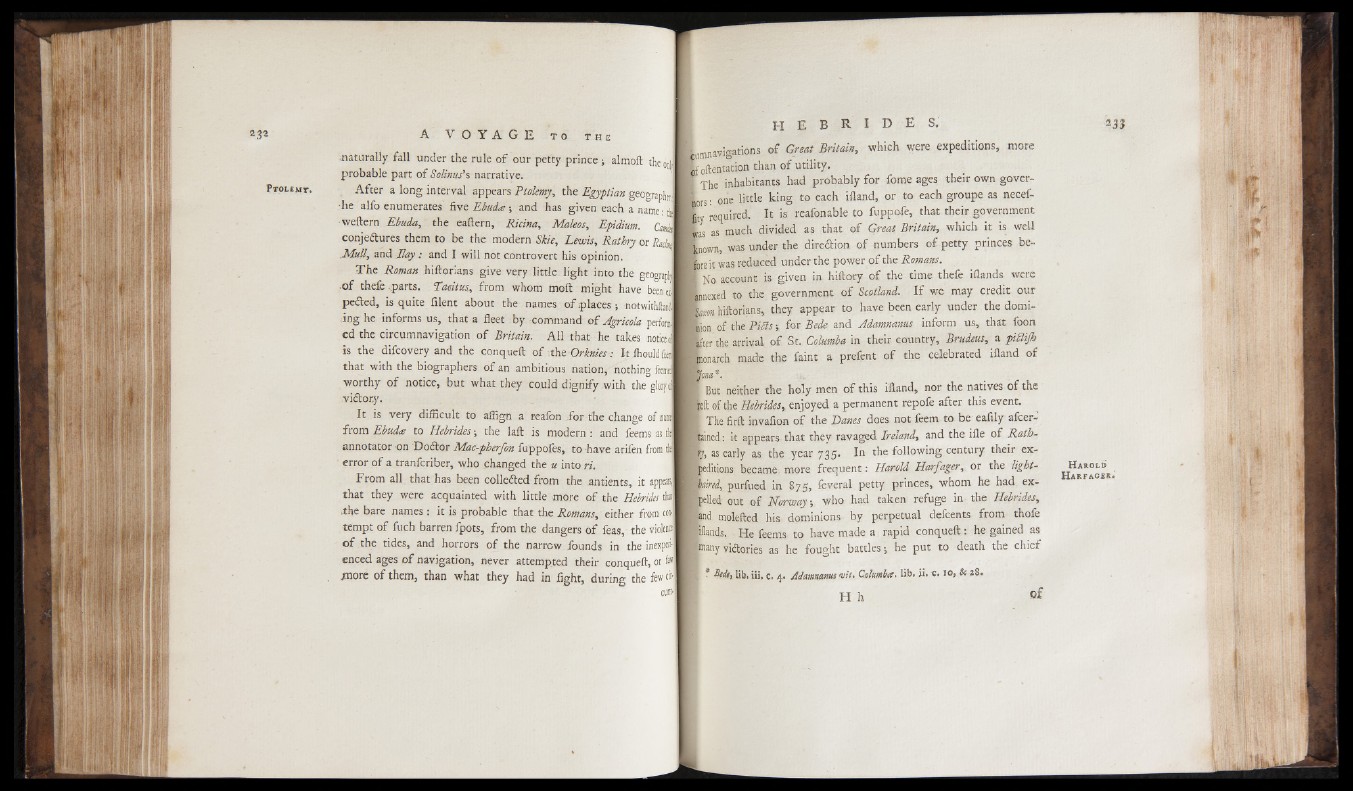
P t o l e m t .
naturally fall under the rule of our petty prince ; almoit the oJ
probable part of Solinus’s narrative.
After a long interval appears Ptolemy., the Egyptian geographer]
he alfo enumerates five Ebuda; and has given each a name J
weftern Ebuda, the eaftern, Ricina, Maleos, Epidium. C j
conjeitures them to be the modern She, Lewis, Rathry or Raid
.Mull, and flay: and I -will not controvert his opinion.
The Roman hiftorians give very little light into the geograpj
•of thefe parts. Tacitus, from whom mo ft might have been J
peited, is quite filent about the names o f places; notwitlilij
,ing he informs us, that a fleet by command o f Agricola perforj
ed the circumnavigation o f Britain. All that he takes notice i
is the difcovery and the conqueft of the Orknies : It ihould f j
that with the biographers of an ambitious nation, nothing feed
worthy of notice, but what they could dignify with the glory J
viitor.y.
It is very difficult to affign a reaibn .for the change of cia
from Ebudte to Hebrides; the laft is modern : and feems as to
annotator on Doctor Mac-pherfoii fuppofes, to have arifen from ti
error o f a tranfcriber, who changed the u into ti.
From all that has been collected from the .antients, it appearJ
that they were acquainted with little more of the Hebrides ta»|
the bare names : it is probable that the Romans,' either from rcj
tempt of fuch barren fpots, from the dangers of feas, the violencl
o f the tides, and horrors o f the narrow founds in the inexpfflj
enced ages o f navigation, never attempted their conqueft, or Cfl
more o f them, than what they had in fight, during the few cir-j
cm
■iimnavigatians of Great Britain, which were expeditions, more
Bfoftentation than of utility.
■ The inhabitants had probably for fome ages their own gover-
B ,rs : one little king to each ifland, or to each groupe as necef-
[ fity required. It is reafonable to fuppofe, that their government
I Las as much divided as that of Great Britain, which it is well I town, was under the direction of numbers of petty princes be-
■orek was reduced under the power of the Romans.
■ No account is given in hiftory o f the time thefe ifiands were
[annexed to the government of Scotland. I f we may credit our
H nm hiftorians, they appear to have been early under the domi-
I nion of the P ifts; for Bede and Adamnanus inform us, that foon
[■afar the arrival of St. Columba in their country, Brudeus, a piblijh
[ monarch made the faint a prefent o f the celebrated ifland of
■ w ’ .
I But neither th e h o ly men o f th is iflan d , nor th e n ativ es o f the
H e f t of the Hebrides, en jo y ed a permanent repofe a fte r this ev en t.
■ The firft invafion of the Hanes does not feem to be eafily afcer-
j . tained: it appears that they ravaged Ireland, and the ifle o f Rath-
■ry, as early as the year 735. In the following century their expeditions
became, more frequent: Harold Hatrfager, or the ligbt-
H > ired, purfued in 875, feveral petty princes, whom he had ex-
dwelled out of Norway; who had taken refuge in the Hebrides,
Hnd molefted his dominions by perpetual defcents from thofe
Hflands, He feems to have made a rapid conqueft: he gained as
^■nany victories as he fought battles; he put to death the chief
■ ? htt, lib, iii, c, p Adamnanus <vit. Columba. lib. ii. c. 10, & 28.
H h S f
H a r o l d
H a r f a c e k .